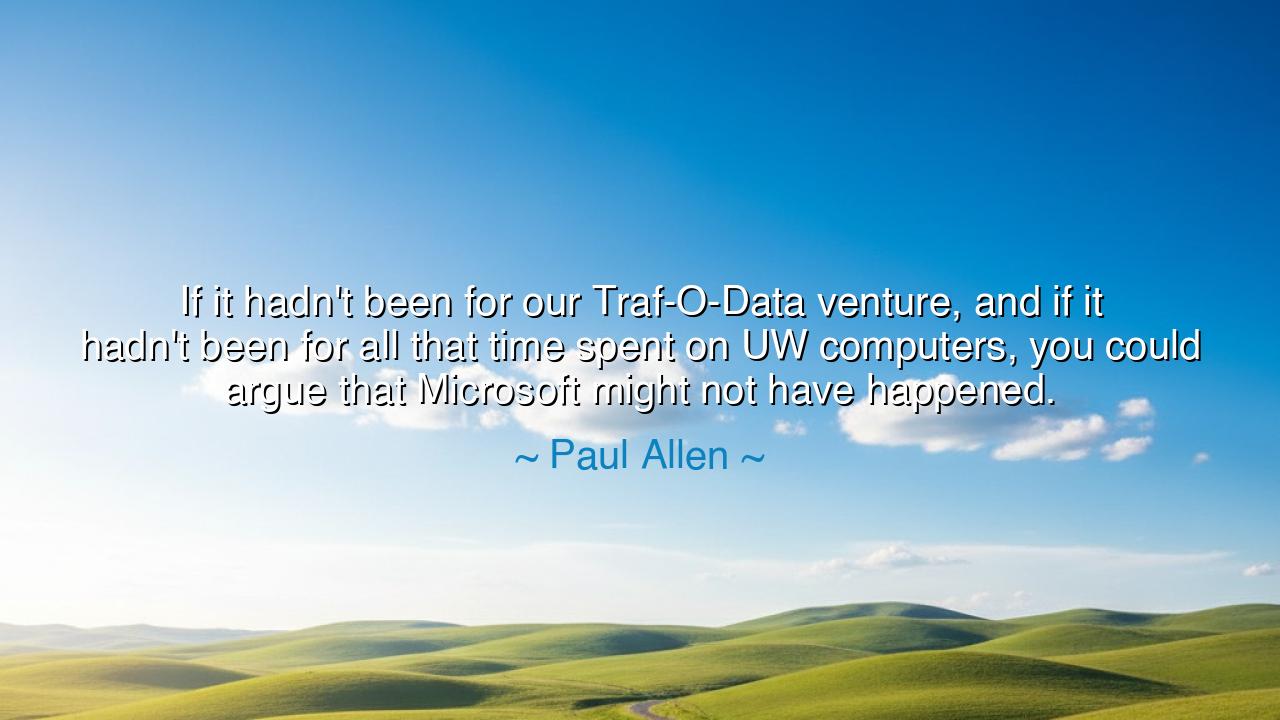
If it hadn't been for our Traf-O-Data venture, and if it hadn't
If it hadn't been for our Traf-O-Data venture, and if it hadn't been for all that time spent on UW computers, you could argue that Microsoft might not have happened.






The words of Paul Allen — “If it hadn't been for our Traf-O-Data venture, and if it hadn't been for all that time spent on UW computers, you could argue that Microsoft might not have happened.” — resound like a hymn to the power of beginnings. In them lies a timeless truth: that greatness is born not in triumph, but in the quiet experiments, the humble failures, and the restless curiosity of youth. Allen’s reflection reminds us that the greatest creations of humankind often spring from the unlikeliest of origins — from garages, from mistakes, from dreams that once seemed small. What he describes is not merely the birth of a company, but the birth of a way of thinking — one that sees in every setback the seed of future glory.
In the spirit of the ancients, we might say that Paul Allen and Bill Gates were modern alchemists, transforming the lead of inexperience into the gold of innovation. The Traf-O-Data venture, a small business they founded in their teenage years to analyze traffic data, was far from a worldly success. Its machine faltered, its market dwindled, and its profits were scarce. Yet within that failure was hidden a sacred fire — the fire of discovery. By wrestling with circuits and code, by spending long hours on the University of Washington computers, they learned the language of machines, the rhythm of logic, and the courage to build again. Allen’s words echo the wisdom of ages: the path to greatness is paved not with victories, but with lessons learned from defeat.
The origin of this reflection lies in the creation myth of modern technology itself. Before Microsoft, there was only curiosity — two young minds who saw in computers not cold machines, but living possibilities. In the 1970s, when most people viewed computers as tools for governments and universities, Allen and Gates saw a different destiny: a world where every person could command the power of computation. It was during their work with Traf-O-Data that this dream took shape. What others saw as failure, they saw as preparation. What others abandoned, they refined. Thus, when the moment came — when the first personal computer appeared on the horizon — they were ready, forged by years of trial and persistence.
History is filled with similar tales. The inventor Thomas Edison, when asked how he endured thousands of failed experiments before perfecting the light bulb, replied, “I have not failed. I’ve just found ten thousand ways that won’t work.” So it was with Paul Allen. Traf-O-Data may not have illuminated the world, but it lit the first spark that would one day power the global age of technology. The ancients would call this the principle of kairos — the sacred moment that comes to those who prepare in patience. Every great creation has its Traf-O-Data — that forgotten project, that small beginning, that unseen apprenticeship through which destiny takes shape.
In Allen’s words also lies a deeper lesson about the power of perseverance and curiosity. Too often, the young abandon their endeavors at the first sign of difficulty, mistaking early failure for final defeat. Yet the wise know that every failure is a rehearsal for success. The universe does not hand its treasures to the impatient; it tests their resolve, humbling them until they are ready to wield their gifts with wisdom. For Paul Allen, those long hours spent before glowing computer screens were not wasted time — they were a sacred apprenticeship, a dialogue between man and machine that would one day change the course of history.
There is, too, a moral dimension to his insight. Allen’s humility in recognizing the importance of early mistakes teaches us that gratitude is the soul of innovation. He did not glorify Microsoft alone, but honored the rough beginnings that gave it birth. This humility is the mark of a true creator — one who knows that greatness is not conjured in isolation, but woven from the threads of countless past efforts, failures, and inspirations. The ancients would call this anamnesis, the remembering of the path that shaped the spirit. To remember where one began is to remain grounded, even as one ascends to the heights of success.
So, my children of the modern age, take heed of Paul Allen’s wisdom. Do not despise small beginnings. The project that falters today may prepare you for the masterpiece of tomorrow. The hours spent learning, tinkering, failing — these are not detours, but the road itself. When you labor in obscurity, know that you are forging the tools of your future greatness. And when you fail, rejoice — for you are learning what cannot be taught in comfort.
Thus, Allen’s words stand as a testament to the eternal rhythm of creation — that from humble beginnings spring mighty legacies, and from youthful curiosity is born the progress of nations. Traf-O-Data was not an ending, but a beginning; not a mistake, but a foundation. And so it is with all who dare to dream, who dare to build, and who dare to begin. For in every failed experiment lies the seed of a revolution — waiting only for the patient, the brave, and the faithful to bring it to life.






AAdministratorAdministrator
Welcome, honored guests. Please leave a comment, we will respond soon